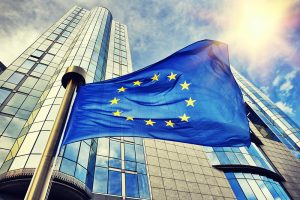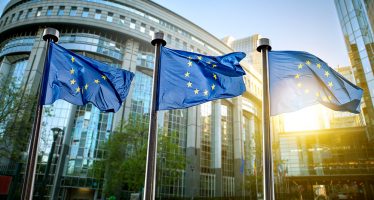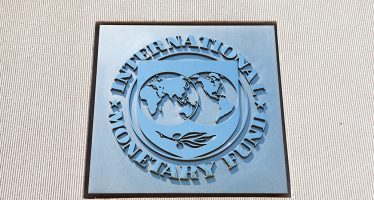The Reassertion of National Self-Interest

Brussels, Belgium: EU flag waving in front of European Parliament building.
The Great Society is making a comeback with Big Brother possibly in attendance. After a decades-long retreat from public life, the state is firmly back in control of society – and the economy. Private interests, sacrosanct until weeks ago, no longer take precedence over the collective.
An enemy both invisible and implacable claimed laissez faire as its first victim and went on to bury the neoliberalism that had reigned supreme since the 1980s. As the full and terrifying scope of the pandemic slowly emerged, so did the realisation that only the state could direct the fight against corona, putting paid to the notion that free markets offer a cure for every conceivable ill. This abrupt reset of national priorities represents a tectonic shift in attitude. It will likely reverberate for years to come.
Barely one month into the pandemic, the European Union shelved its state-aid rules, until then rigorously applied, and allowed national governments to throw troubled industries a lifeline. Not that anyone was waiting for a green light from Brussels: almost immediately after the pandemic struck, governments reasserted their full sovereign powers including those prerogatives that, at least in theory, had been transferred to the EU.
Ryanair’s chief executive Michael O’Leary is fighting a hopeless rear-guard action when he threatens to sue the union over its newfound tolerance of state aid to keep corporate ‘dinosaurs’ in business. In a letter to EU Commissioner for Competition Margrethe Verstager, the buccaneering airline exec strongly objects to ‘countries selectively gifting billions to their inefficient flag carriers’.
Though he clearly has a valid case, Mr O’Leary has failed to read the memo: for now, mean and lean are out. The inadequacy of business models that depend on zero-hour contracts and other flexible labour practices has been laid bare as unemployment skyrocketed to dizzying heights within days of the lockdown. Suddenly, hordes of idled self-employed workers discovered that they fall outside the purview of safety nets. The rickety nature of its jobs is not a bug of the gig economy, but a feature. Governments were forced to quickly patch up social security provisions to keep untold millions from descending into abject poverty.
As the trillions in emergency cash permeate the economy, politicians are demanding that corporations of all sizes clean up their act and join a wider social compact as they do so. Mass firings, management bonuses, dividend payouts, stock buybacks, production offshoring, and many other tenets of the contemporary corporate culture will no longer be tolerated at companies that accept state support. In return for their money, governments claim a seat on the board. A plan to double the compensation of KLM managing director Pieter Elbers, hatched before the corona outbreak, was quickly shelved after an angry phone call from Dutch Finance Minister Wopke Hoekstra who has earmarked €4 billion for the airline.
Guntram Wolff of the Bruegel Institute, a Brussels-based economic think tank, fears that by relaxing state aid rules the European Union may prolong the agony of companies with outdated business models: “Subsidies for dinosaurs might mean that money for new and dynamic sectors could be missing.”
Before the pandemic, the EU had been busily discussing ways to promote the rise of European champions. It bothers the union that Europe has so far been unable to create a nurturing environment for innovation and disruption on a truly grand scale. Significant sums were set aside to find an Old-World answer to Google, Amazon, and Facebook.
Ironically, analysts almost unanimously pointed to Commissioner Verstager as the main obstacle to European industrial leadership. Her insistence on enforcing strict competition rules has stopped the emergence of a few corporate powerhouses of note. In 2019, she vetoed the merger between Alstom and Siemens which would have allowed both train manufacturers to compete more successfully with CRRC, the dominant Chinese maker of rolling stock. Citing consumer protection, Ms Verstager’s decision provoked anger in France and Germany, and calls for a thorough overhaul of competition rules.
However, European governments are quite selective in the battles they choose to fight. Again in 2019, French President Emmanuel Macron, a passionate advocate of European champions, blocked the $33 billion merger of Italian American carmaker Fiat-Chrysler Automobiles (FCA) and homegrown Renault which would have created the world’s third-largest automotive conglomerate with synergies ‘made in heaven’, according to industry watchers. Though the French government did not forbid the merger outright, it laid down so many red lines that the deal fell through.
Thus, it transpired that the creation of champions was perhaps not so much thwarted by the presumed rigidity of the European Commission as by the remnants of national industrial policy. However, a trend towards increased economic nationalism, already faintly detectable before the pandemic, appears to have been reinforced by the emergency.
Attitudes in Germany and The Netherlands, two stalwarts of free trade, free markets, and free enterprise, have shifted dramatically. Both Berlin and The Hague left little room for doubt as they moved decisively to shield iconic corporations from the pandemic’s fallout. Any pretence of cooperation and coordination went out the window as the Dutch government rushed to the rescue of national flag carrier KLM, ignoring the fact that the airline in 2004 merged with Air France. The French, in turn, unveiled a €7 billion package for their part of the company. Both governments made sure that the cash only benefits their national carrier with no spill over to the ‘enemy’. In The Netherlands, politicians now debate tearing KLM out of the marriage, long considered convenient and unfortunate in equal degrees.
The Great Society, that has a moderately corporativist state as its booster engine, rose out of the rubble left by the Great Depression of the early 1930s. That script is being revisited as the Corona Recession takes hold and cuts through the very fabric of society. This happens not by choice but is powered by the force of logic: governments that spend untold billions to underpin sagging economies and markets will demand a much greater say in their running. This need not worry big business: whilst its operational premises and the rules of competition may change, its ability to make money will not. However, shareholders may not be so lucky and can expect to see their influence – and income – curtailed.
Should they manage to survive the pandemic, small- and medium-sized businesses in Europe and North America may also expect to benefit from more localised supply chains and the onshoring of production processes previously exported to low-wage economies. This is more than just wishful thinking: the staggering rise in unemployment levels, a source of significant political tension, will force governments to leverage their new say and sway in the management of private business affairs to create jobs. The confidence in the ability of markets to do so has taken a severe hit in nearly all countries.
From Italy and Spain to Denmark and Germany, politicians seem determined to intervene and spark a quick and formidable post-corona economic rebound. Interestingly, this shared resolve also reinforces the importance of the European Union and its common market. Once the first scare has receded, the realisation will undoubtedly set in that no single member state is able to rebuild its shattered economy alone. That provides the union with a much-needed raison d’être. Solidarity may have gone missing when pandemic panic took hold, but it will likely return when dictated by national self-interest. In fact, not some higher ideal but plain national self-interest is the reason why the EU exists to begin with.
You may have an interest in also reading…
Europe: Fig Leaves to Save Spain and Italy
Looking to score without breaking a sweat, European politicians of almost every ideological persuasion often turn on ‘Brussels’, assigning blame
Debt Relief Needed to Preserve 30 Years of Progress
A grand coalition of creditors is to provide debt relief to the world’s least developed countries. Earlier this week, the
Out with the Old: President Biden Sets to Work, COVID Top Priority
Freshly installed in the Oval Office, the 46th president of the United States immediately set to work reversing a slew

















































































